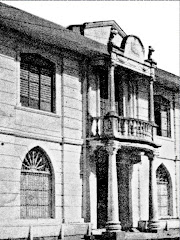Servants of the People
I am posting the Editorial of the Sunday, December 21 issue of the Philippine Daily Inquirer as a tribute to Ate Marynat and Rey, who's also a former government auditor.
-----------------
OVERLOOKED in all the political bluster over the seemingly endless lineup of officials caught with their fingers in the cookie jar of the state are the silent heroes who made such exposés possible. We don’t mean the politicians milking the never-ending scandals for all they’re worth, politically. We refer to the civil servants, the loyal public servants, who by doing their jobs without fear or favor, provide living testimony that there remain people in our government who really live by the principles of duty, honor and country.
The people at the top may know the rules so well that they can bend them. They may know the ins and outs of government so completely that they can mutate otherwise decent policies into an instrument for clever acts of graft and corruption. They may be able to influence their subordinates into participating in their crimes, and partaking of the fruits of their criminal behavior. But they can never fully cover up what they did wrong; sooner or later, how and when they broke the rules will be revealed.
The selective memory of officials like Jocelyn “Joc-joc” Bolante, and their deceit when it comes to their official acts, have been exposed time and again, by the diligent work of government auditors who may not be able to prevent crimes, but who ferret out incriminating documents and, at times, even preserve them so that they can be used as evidence to prove official wrongdoing. That is why whether through claims of executive privilege, or the outright destruction or falsification of records, so much official energy is used up to hide and keep hidden the paper trail. Because that paper trail, sooner or later, will lead to the crooks—and their allies and godfathers in government.
Officials, high and low, often forget the principle of command responsibility as understood and advocated by President Diosdado Macapagal. During his term, he proposed that heads of departments should consider themselves responsible for acts of omission of the officials under them, even if they had no personal fault or participation in those acts.
He gave the example of department secretaries who he felt should resign because of major shortcomings in their departments, even if those shortcomings were unknown to them. In his case, he believed that even if personally honest, presidents should hold themselves responsible for graft and corruption in their administrations.
But, of course, both in his time and since, advocating command responsibility is one thing; and demonstrating it to and demanding it of subordinates is another. Filipinos of an older generation will recall the sensational Stonehill case, in which the American tobacco magnate Harry Stonehill’s “donations” to a dizzying number of officials were exposed. The Macapagal administration barely survived the political fallout from the exposé.
Macapagal ended up deporting Stonehill to prevent his testifying before Congress, while his administration dragged in both the living (his Vice President Emmanuel Pelaez) and the dead (Manila Mayor Arsenio Lacson and even his widow) in what came to be known as squid tactics to becloud the evidence and the issues.
It can even be said that the blueprint for the Garcis and Joc-jocs of today surviving public investigations was drawn up in the 1960s. Then, as now, however, official wrongdoing may never be punished. However, because of our civil servants who take their responsibilities seriously, there could be a paper trail of evidence that can at least reassure decent-minded citizens that no crime can go unexposed for long.
The defect, then, doesn’t lie in our civil servants, or at least in the auditors charged with keeping tabs on the paper trail, but rather, on a justice system which can be regularly confronted with mountains of evidence, but which never seems capable of sending more than a tiny fraction of wrongdoers to jail.
But to the auditors, we believe, our nation owes its gratitude. Well done, good and faithful servants of the Filipino people.


1 comment:
Hello Toti,
Thanks for posting this editorial in the PDI. Yes, this uplift my spirit again in preparing the 2008 Annual Audit Report (AAR) of my auditee agency (no name ksi baka this could be read by others although u know the agency I am referring to).
With my recent experience in my 2007 AAR, I have proven all the things that others are telling that "sayang lang ang pagod, afterwhich, pag malakas ang involved s findings eh bale wala yan, and baka ikaw pa ang magka meron ng problema".
Anyway, i am very grateful to my parents and DPS, next to GOD for being a very honest person, modesty aside. .. ... .ehhehhe. If not for my self conviction, I should have been rich for being a resident auditor of different national government agencies for the past 21 years. But I believe in saying that "walang baho na hindi sisingaw". So I just do the audit in accordance with an existing rules and regulations and of course, complete with documentation and complete audit trail. By the time that anybody needs our document, then we can present it in a way that for a reader, the person involved is already at fault. But problem is the Justice system in our country. COA has no police power in our mandate. We just prepare the report and render a year end opinion on the fairness of the presentation of the Financial Statements. This what makes a COA Auditor an unsung hero, di ba classmate Rey Rafer. .. .. .
Sweet and bitter audit happenings in 2008 serve as a lesson. MERRY CHRISTMAS & A Prosperous New Year to all of your dear classmares.
Marynat
Post a Comment